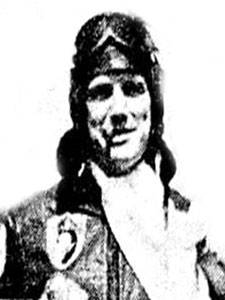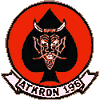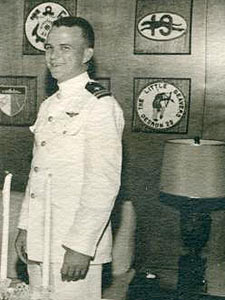| |
|
|
|
Gerald Ray Roberts
Lieutenant Commander
VA-196, CVW-19, USS BON HOMME RICHARD, TF 77, 7TH FLEET United States Navy San Marcos, Texas April 08, 1934 to December 02, 1965 GERALD R ROBERTS is on the Wall at Panel 3E, Line 120 See the full profile or name rubbing for Gerald Roberts |
  |

|



| |

LCDR GERALD RAY ROBERTS
|
|
I wore Gerald's bracelet for many years. Thanks to the internet and veteran's web-sites, a few years ago I discovered that Gerald's remains were returned in 1993-1994 and identified in 1996. I couldn't control the tears, feeling as if I had lost a dear friend. I have never been able to see a picture of Gerald nor find any contact with his family or those who knew him personally. My heart and prayers go out to them for their ultimate sacrifice.
God bless you! |
|
I was in charge of the American Team that excavated and found the evidence, which ultimately led the scientists to positively identify the remains of Gerald Roberts. I am still in the Army today and even though I am currently serving in support of Operation Iraqi Freedom I will always consider the mission to repatriate Gerald's remains as the most honorable mission that I will ever have the opportunity to accomplish. I have wondered for many years whether Congress approved this case and was very happy to have found this web site.
Major James Looney |
The MissionOn 2 December 1965, LCDR Gerald R. Roberts, flying an A-1H SKYRAIDER (BuNo 139755), launched from USS Bon Homme Richard to conduct armed reconnaissance over North Vietnam. His flight's mission was to search out and destroy troops, military convoys, road bridges, supply barges, or similar targets of military value.Roberts' flight spotted a small road bridge along Highway 1, which runs more or less parallel to the coast. The village of Ky Anh was about 6 miles NNW of the target, which was about 39 miles NNW of Dong Hoi and some 60 miles southeast of Vinh. On his third pass against the bridge, LCDR Roberts crashed. Although intense ground fire had been present it was unclear if Roberts had been hit or if he inadvertently flew into the ground. In either case, there was no evidence that he escaped the aircraft before impact or survived the crash ... no parachute was sighted, nor were any radio signals heard. The crash site was in a densely populated area on the edge of forested mountains about 10 or 12 miles inland. Ground fire precluded a close inspection of the wreckage. On termination of the SAR effort LCDR Roberts was declared as Killed in Action/Body Not Recovered. Joint US-SRV investigations in 1993 and 1994 obtained information from local witnesses and recovered aircrew equipment and human remains from the wreckage. On 04 October 1994, the Vietnamese government turned over two sets of remains. On 13 April 1995, one set was identified as Marine Sergeant John F. Burns, who was captured 25 December 1967 and who reportedly died in captivity two years later. On 10 October 1996, almost 31 years after he was shot down, the second set of remains was identified as those of Lieutenant Commander Gerald Roberts. At the time of his loss, Attack Squadron 196 was based at Naval Air Station Whidbey Island, Washington. In 1997, at the request of his family, Lieutenant Commander Roberts was buried at sea from the carrier USS Carl Vinson in the Strait of Juan de Fuca, which forms the passage joining Whidbey Island with the Pacfic Ocean. |
| Contact Us | © Copyright 1997-2019 www.VirtualWall.org, Ltd ®(TM) | Last update 08/15/2019. |